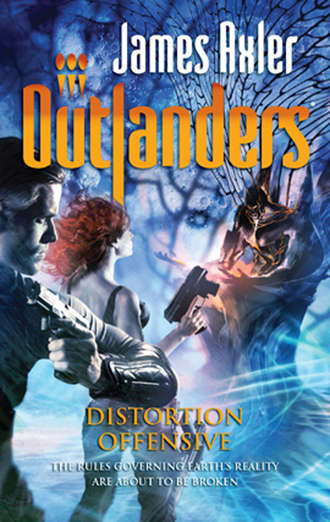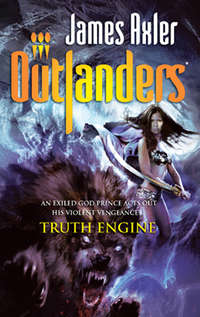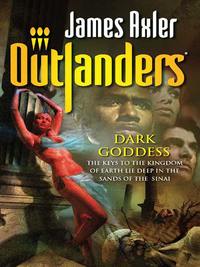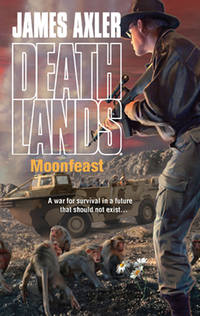
Полная версия
Distortion Offensive
Kane reached for the door, turning the handle. “Why don’t we go say hello?”
With that, the tall ex-Mag pushed open the door and made his way inside, like a jungle cat stalking warily into a cage.
“Balam, pal o’ mine,” Kane spit through clenched teeth, his eyes focused on the weird, alien form at the desk, “it’s been a long time.”
“Not too long I hope, Kane,” Balam chirped, his doleful eyes gazing at the new entrants as they filed into the room.
“It could never be too long,” Kane growled sarcastically.
Lakesh and Donald turned from the desk, and Lakesh gave Kane a warning look. “Now, Kane, let’s show some hospitality toward our honored visitors.”
“Hospitality,” Kane repeated, speaking the word as if it were something jagged that had just cut his tongue. “Right.”
Feeling the tension in the room, Brigid stepped forward and diffused it with her bright, sincere smile. “How have you been, Balam? How’s Little Quav?”
“I have been keeping myself to myself,” the gray-skinned alien replied simply in his softly spoken manner. “Quav seems to have settled into life in Agartha well. We have found some places where she may delight in play.”
Brigid laughed when she heard that, turning her attention from the strange, alienlike humanoid at the far end of the room to the playful child on Reba’s lap. “Listen to you, you old softie,” Brigid said. “I never pictured you for the doting parent type.” This was not entirely true, of course, for Brigid knew that Balam had at least two sons who had been raised in the underground city of Agartha. Still, it did genuinely amuse her to hear Balam speak with such a gentle tone of real emotion.
“Children change us,” Balam admitted, his sinewy, six-fingered hands weaving through the air in a nervous tic. “They have the ability to show our true faces, no matter how we try to hide them.”
Resting against the wall, Kane remained tense. His steely gaze had not left Balam since he had entered the room. “So, what?” he challenged. “This a social visit?”
Balam shook his huge, bulbous head ever so slightly, and his lips mouthed the word no so quietly that Kane wasn’t sure that the visitor had actually spoken at all. “It saddens me to have to come to you at this time, but I have been made aware of a situation that requires urgent attention.”
Brigid Baptiste pulled up a free chair to join Balam at the desk, while Kane took several steps closer until he loomed over them all, his shadow dark on the alien’s domelike pate.
“What sort of a situation?” Brigid probed gently.
Balam raised his head slightly, and Brigid could not be sure if his fathomless eyes were staring at her or through her. “Many millennia ago, the Annunaki established a store that would house all of their knowledge,” he explained. “This storehouse was called the Ontic Library, for it contained all of the caveats that defined the real from the imagined or the spiritually malleable.”
Brigid nodded, aware of the philosophical resonance of the term ontic.
“Over the past few days I have felt things in my head,” Balam continued, clearly referring to his telepathic nature, “that make me suspect that the library has been breached and may, in fact, be being broken apart.”
Kane shrugged, clearly unimpressed. “So it’s a library,” he said. “Big deal.”
Balam turned to face Kane, staring at him with those strangely expressive black eyes, but he took a long, calming breath before he actually spoke. “This is not a library as you understand the term,” he explained. “This is a storehouse for the very rules governing this reality. Should it be broken apart, destroyed, there is a significant risk that ‘the real’—that is, your world—will cease to hold integrity.”
“So, the world is under threat?” Kane asked, incredulous.
“More,” Balam stated, “the very rules that underpin the world are threatened. The Ontic Library is a store of knowledge so powerful that it holds the structure of ‘the real’ in place. Without it, your world, your universe may very well cease to hold together.”
Kane looked uncomfortable at the thought, and his brow furrowed with irritation. “Why would they do that? Why create something that could destroy everything around you?”
“Is your knowledge of human history so poor?” Balam challenged in his soft-spoken manner. “Or have you conveniently forgotten the bloodshed caused by humankind barely two centuries ago at the push of a single button?”
“But a library,” Kane said, still trying to comprehend the concept. “Why would they—?”
“The Annunaki are multidimensional beings, Kane,” Balam stated. “Do you concern yourself that food may spoil in your larder, or that a pot might overboil while inside your oven? Everything has a risk, even the retention of knowledge.”
Kane nodded, still feeling uncomfortable at the notion he had just been presented with.
Sitting at the desk, Brigid leaned forward to regain Balam’s attention. “So, where is this Ontic Library located?”
“Beneath the ocean you call the Pacific,” Balam stated emotionlessly, “off the coast of the barony of Snakefishville.”
“Hope,” Brigid breathed, a horrible realization knotting the pit of her stomach.
“Had to fucking be,” Kane growled, clearly irritated that he hadn’t realized it before now.
BACK IN THE FISHING VILLE of Hope, a separate Cerberus field team agents had been operating out of the shantytown area that surrounded the main ville. Like Kane’s group, this team was also a three-person operation, but they had journeyed to the overwhelmed ville using an interphaser unit and had traveled the remaining distance on foot, carrying much-needed medical supplies to the area. Right now, the three operatives were handing out antibiotics to a youthful family that was suffering a bout of skin rashes due to the poor sanitation of the area.
Domi looked at the eldest of the six children in the covered shack where her team had set up base. The child was a dark-haired boy of perhaps four years old, and Domi recognized the fear in the child’s eyes. He was afraid of her because she looked different, Domi knew, but she wasn’t here to make friends. Instead, she ignored him, turning her attention to the busy dirt street that ran between the slanting temporary dwellings while her colleagues, Edwards and Johnson, doled out the relevant medical supplies.
Domi was a small-framed woman, standing barely five feet tall, with the slender build of an adolescent girl. Her skin was a vivid white the color of chalk, and was complemented by similarly colored hair, cut short in a pixie style. She wore a simple outfit that left much of her unusual skin on display, cutoff denim shorts that sat low to her belly and finished high on the hip, and an abbreviated crop top in a dull tan color that clung tightly to her small, pert breasts. Contrary to her usual style, she had elected to wear shoes while round the refugee camp, a pair of muddy pumps with a gripping, cushioned sole; she would prefer to go barefoot given the choice.
Domi was a child of the Outlands, having grown up far from the protective walls of Cobaltville, where she had ended up prior to joining the Cerberus team. As such, her outlook was quite different—and often less diplomatic—than that held by her colleagues. A fearsome six-inch knife was strapped to her ankle, and she wore a Detonics Combat Master handgun in a leather holster slung low on her bare, chalk-white hip. Overall, Domi looked like a human figure that had been carved from bone. But it was her fiercely darting eyes that added to the feeling of otherness in the people who saw her. In stark contrast to her pure white flesh, Domi’s eyes were a deep scarlet color, like two glistening pools of blood.
Right now, Domi’s bloodred eyes were scanning the street, watching the many figures trotting along it with their meager belongings, their buckets and bowls of water, moth-eaten blankets and clothes. Mangy dogs and flea-bitten cats stepped out of the way to avoid the humans as they went about their business, and the street itself stank of human waste. Domi wrinkled her nose at the stench, all the more repulsed for her senses were unusually perceptive. Where Edwards and Johnson had become used to the unpleasant reek of Hope, Domi remained disgusted and a little nauseous despite being there for over a day.
A group of people was making its way down the street, six in all. Dressed in rags like the others around them, they seemed somehow different to Domi, giving her the impression that they were much more organized. She watched them for a moment, realizing that despite their ragged appearances, they were walking in perfect time, like soldiers at a parade. Not soldiers, she realized—birds. They moved like flocks of birds on the wing, turning as one.
Domi watched as the six people strode past, their faces masked behind the hoods of their dirt-caked cloaks. Weird, she thought.
From behind her, back in the shack where her colleagues were distributing medicines, Domi heard Edwards growl. She turned just in time to see the tall, muscular man lunge up from where he sat, knocking a vial of medicine from the table in his haste. An ex-Magistrate, Edwards was a powerfully built man, dressed in his preferred garb of combat fatigues with shirt open to show the drab-olive undershirt that clung to his chiseled pectorals. Edwards’s hair was shaved very close to his scalp, and the start of a beard was forming on his chin now in what seemed an almost comical imitation. His right ear was misshapen where it had been clipped by a bullet during an escapade on Thunder Isle.
Sitting beside Edwards, Henny Johnson gazed up at him with openmouthed surprise as he lunged up from the table. A little taller with a little more flesh on her bones than Domi, Henrietta Johnson wore her blond hair cut into a severe bob that ended just below the lobes of her ears. She was a freezie from the twentieth century, one of a number of U.S. military personnel who had been cryogenically frozen and placed in the Manitius Moon base before the nukecaust had hit. Awoken two hundred years later, Henny was one of over three dozen freezies who made up the bulk of the personnel at the Cerberus redoubt. Her field of expertise was artillery, but she had a solid working knowledge of medicine so she had taken point on this mission. If they came across anything serious, Henny was instructed to seek local help or to converse with physician Reba DeFore back at Cerberus headquarters.
“Everything okay, gunsmith cat?” Henny asked, fixing Edwards with a stern look as the people who had come for their help scampered out of his way as if avoiding a rampaging bull.
Edwards looked puzzled for a moment, rubbing at his forehead as though in pain. “What?” he asked, his voice strangely distant as if he were just now waking up.
Henny calmed the other people in the open shack with a few hushed words and a gesture before rising to consult with Edwards. “You just freaked out a little there, cowpoke,” she said in a low voice.
Edwards wiped his fingers against the ridge of his brow, playing them along the bridge of his nose so hard that Henny saw white streaks of pressure appear there before fading once more into his natural skin color. “My head’s killing me,” Edwards growled. “Came on all of a sudden, a real pounding bastard of a thing.”
“Do you ever suffer from migraines?” Henny queried.
“Me? No.” Edwards shook his head. “Probably just tired, being cooped up in here for a day treating the locals in their filth. Reminds me of the Tartarus Pits back…” Edwards stopped. He was about to say “home” but realized he hadn’t been a Magistrate for a long time now, and the Tartarus Pits were a thing of a past best forgotten.
Domi watched from her position by the door, checking the street again to see if any more locals were waiting for their services. The strange group of six was gone, departed amid the labyrinthine alleyways that made up the shantytown. In fact, the streets seemed suddenly clear, a much-appreciated lull in the stream of locals needing help. “Why don’t you go for a walk?” she suggested to Edwards. “Clear your head. Me and the Hen can man the fort for a while.”
Edwards nodded lethargically, his head still sore, before brushing past Domi and off into the street of dust. “Thanks, doll, you’re an angel.”
Domi shook her head. “Don’t ever call me that,” she told him with semiseriousness, recalling a rather unpleasant incident in Russia where she really had been mistaken for an angel.
As Edwards ambled off down the street, Henny arched one blond eyebrow as Domi came over to join her. “‘The Hen’?” she asked.
Domi shrugged. “Rule of the Outlands. Adapt and survive.”
GRANT FOUND CLEM BRYANT in the Cerberus cafeteria. The chef was busily deep-frying some chicken in batter, while other personnel rushed back and forth, dressed in white with their hair held back in nets.
“Looks fattening,” Grant observed as he approached Clem at the deep-fat fryer.
Clem glanced at him and smiled, a mischievous twinkle in his blue eyes. “But fattening is tasty,” he said, “and we all deserve a treat once in a while.” Clem was a tall man in his late thirties, with dark hair that swept back from his high forehead, and a trim goatee beard on his chin. An oceanographer by education, Clem was one of the Manitius Moon base freezies who had awoken to a world two hundred years after he had been placed in cryogenic stasis. With little need for his skills in a mountain redoubt, Clem had turned his attention to the culinary arts and found himself quite skillful at cooking, soon taking a permanent position with the facility’s cafeteria staff. Besides being an oceanographer and a chef, Clem was a quiet but personable individual, who enjoyed his own company and revelled in the completion of a puzzle, be it filling in a Sudoku number grid or finding a challenging cryptic crossword among the vast archives of the Cerberus facility. In short, Clem was an obsessive thinker whose mind regularly deconstructed problems to view them from an alternate perspective. “So, how may I help you, Grant?” he asked in his treacle-rich voice.
Grant held up the clear plastic bag he carried. “I want you to take a look at these,” he explained, unzipping the top of the bag.
Grant held open the mouth of the bag and Clem peered inside, seeing the mollusks resting there in their glistening shells. “Would you like me to cook them?” he queried.
“No.” Grant laughed. “I want you to identify them. You’re the ocean guy, right?”
Bryant nodded before reaching for the handle of his fryer and shaking the sizzling contents. “Oh, yes, I’m the ocean guy,” he agreed. “Why don’t you find yourself a table while I finish up here, and I’ll join you outside in five minutes.”
“I’ll go snag a coffee,” Grant said and he made his way from the kitchen area with the little bag clutched in his grip.
A few minutes later, sans hairnet, Clem walked over to the plastic-covered table where Grant was blowing on a steaming cup of java.
The cafeteria was a large room filled with long, fold-down tables that stretched to seat a dozen people on each side. The tables were covered in a wipe-dry plastic coating. The walls were painted in warm colors, and a line of horizontal, slit windows ran close to the ceiling along the length of the wall farthest from the double door entrance. Because of the size of the room and the amount of available seating, it occasionally doubled for a conference area when something important needed to be announced to all staff, since it lacked the austerity of a more formal venue, which was something Lakesh preferred to avoid. Right now, however, the cafeteria was almost entirely deserted, with just a few personnel sitting finishing a late lunch or enjoying a relaxing drink while they took a well-earned break from their shift. As ever, the room had that scent of all cafeterias the world over, the indefinable musk of warm foods served at strange hours for hungry personnel.
“Well, then,” Clem began in his warm, friendly voice as he took the seat opposite Grant, “let’s take a look at what you have there, shall we?”
Grant tipped the bag upside down and carefully laid the six dead crustaceans on the table between them.
Clem reached for the largest of them, then retracted his hand, clearly thinking better of it. “Are they dead?” he asked.
“Oh, yes,” Grant assured him. “We couldn’t find any live ones. Believe me, we looked.”
Fascinated, Clem took the largest of the mollusks—roughly circular and about seven inches in diameter—and held it up to his eyes, turning it over and over in the light. “Where did they come from?” he asked, still gazing at the coruscating patterns on the strange creature’s oil-like shell. The light seemed to waver across its surface, as if seen through a heat haze, and Clem was already speculating that it in fact had a double shell, the dark one below the clear surface shell that created the slightly disarming optical effect.
Конец ознакомительного фрагмента.
Текст предоставлен ООО «ЛитРес».
Прочитайте эту книгу целиком, купив полную легальную версию на ЛитРес.
Безопасно оплатить книгу можно банковской картой Visa, MasterCard, Maestro, со счета мобильного телефона, с платежного терминала, в салоне МТС или Связной, через PayPal, WebMoney, Яндекс.Деньги, QIWI Кошелек, бонусными картами или другим удобным Вам способом.









